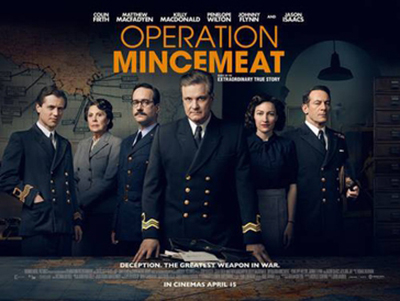The famous line that, in wartime, "the truth is so precious that it must be protected by a bodyguard of lies" is evoked in the first minutes of Operation Mincemeat, a recent war movie directed by John Madden (Shakespeare in Love, The Best Exotic Marigold Hotel) and currently streaming on Netflix. Michelle Ashford's script gives it in voiceover to Ian Fleming, future spy novelist but currently a lieutenant-commander in the Royal Navy's Office of Naval Intelligence, though the actual quote belongs to Winston Churchill, spoken to none other than Joseph Stalin at the Tehran Conference in November of 1943 – four months after Ashford has Fleming type it as he kills time, anxiously waiting to hear news of the Allied invasion of Sicily.
Because in movies, the truth is so low in relative value that it must be warped, twisted, recontextualized, amended and otherwise "improved" by a tapestry of creative fictions – uncharitably known as "lies."
Operation Mincemeat is based on a true story; it takes its title from an elaborate deception played by the British on Nazi Germany, which involved floating a corpse in a Royal Marines uniform onto a beach in Spain, in the hopes that the briefcase the dead man was carrying – full of carefully crafted documents alluding to an upcoming invasion of Greece – would deceive the Axis from reinforcing Sicily, the most obvious target for an invasion.
It's an incredible story, as much because of how it came together as the fact that it actually worked. It's so incredible that it perennially inspires documentaries and YouTube videos and books, and was the subject of a whole other film – Ronald Neame's 1956 movie The Man Who Never Was, based on a book of the same name by Ewen Montagu, one of the men who executed Operation Mincemeat.
Montagu wrote the book in a weekend, after the publication of Operation Heartbreak in 1950 – a spy novel by former cabinet minister Duff Cooper that used the basic facts of Operation Mincemeat as part of its plot. Montagu was asked to help the Naval Office get ahead of the story by publishing their "official version," which was itself carefully pruned of facts and dramatis personae still protected by official secrecy acts.
Montagu himself had a cameo role in the 1956 movie, as an air-vice marshal who expresses his doubts about the plot and the character of Montagu, played by Clifton Webb. Webb's Montagu is very much the hero of his story, concocting and overseeing much of the elaborate deception plan, aided in some part by Robert Flemyng's Lt. George Acres, his faintly louche junior officer and sidekick.

Operation Mincemeat restores Charles Cholmondeley to his rightful importance in Montagu's story – one that Flemyng's George very much downplayed. Cholmondeley, an officer in the RAF, was Montagu's peer in the execution of the deception plan, which apparently began its life as the most outlandish item on a list of suggested operations written by Fleming for his boss, Rear Admiral John Godfrey (Jason Isaacs).
Like Montagu, Cholmondeley had been rejected for active service and relegated to desk duties and, ultimately, intelligence work. A wingless pilot and a landlocked sailor: two of those men (like my father) who would live to downplay their time in uniform because they never fired a shot in anger.
Cholmondeley (Matthew Macfayden) and Montagu (Colin Firth) are strangers working in counterespionage, yoked together when they express enthusiasm for Fleming's mad idea at a meeting of the XX Committee, despite Godfrey's adamant skepticism. With the aid of Hester, Montagu's loyal secretary from his days as a barrister (played by the reliable Penelope Wilton), they turn a damp, sunless basement into a hub of operations for their ruse.
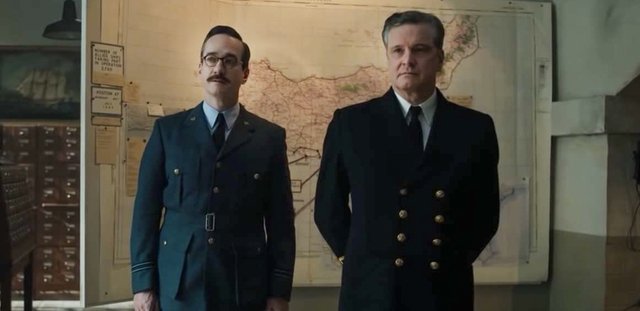
Michelle Ashford does a wonderful job fleshing out the characters as well as the setting; the wartime London of her story is seething with life and erotic charge beneath the blackout, with every door and curtain hiding a packed club, dancehall or speakeasy full of men and women in and out of uniform, desperate to enjoy lives that might have an imminent end or expectation of grief just around the corner.
Macfayden's Cholmondeley is a pedant and an eccentric with the misfortune to be the brother of an actual war hero, recently killed in Burma and conspicuously mourned by their mother. He's infatuated with Jean Leslie (Kelly Macdonald), a secretary and young widow who gets herself assigned to their operation and buys herself "a place at the table" by donating a snapshot of herself to join the personal effects of a fictional Royal Marine courier, to help create the role of "Pam," the dead officer's fiancée.
The quartet of Montagu, Hester, Cholmondeley and Jean begin to craft the persona of Major William Martin, with Montagu and Cholmondeley projecting themselves onto their creation, imaging him as the dashing man they would be if they were in front line service, risking their lives instead of creating subterfuges around which other men might die. The two men forge a bond in their common task that they didn't expect to experience – a bond threatened by events wholly manufactured by Ashford.
Firth's Montagu is a man settled into an uneasy and unhappy middle age despite his accomplishments; his marriage is faltering, his wife and children in America to escape the bombings and threat of invasion – as a Jew, Montagu is sure of his fate should the Nazis conquer Britain. It gives him a brooding but solicitous quality that sparks an attraction between himself and Jean, and a sullen jealousy in Cholmondeley.

This makes Cholmondeley a pawn in a subplot – a vindictive quest by Fleming's boss, Godfrey, to prove that Montagu's bohemian brother Ivor (Mark Gatiss) is a Soviet agent, which will discredit Montagu, for whom Godfrey has an unaccountable animus. Fleming had no role in Montagu's original book or the subsequent movie, but as the loosening of official secrecy over subsequent years made the writer's part more notable, it has become the hook upon which many retellings of Operation Mincemeat have hung.
Ashford and Madden do their best to make the Office of Naval Intelligence look like the prototype of James Bond's MI6, with Godfrey actually called "M" by Fleming and the boffins in charge of the science and gadgets of the operation referred to as "Q Branch". A brief scene even has Fleming inquire about a wristwatch sitting on one of their workbenches. He's told that it has a saw built into its bezel; Johnny Flynn's Fleming smiles slyly when he presses the button that makes it whirr. The Axis might be the enemies of the moment, but nobody in positions of real power are fooling themselves that their Soviet allies won't be the real opponent soon enough, so Godfrey is covertly beginning the Cold War while the hot one is still being fought.
Ewen Montagu did, in fact, have a brother named Ivor who was a bohemian dilettante and communist – he worked with Alfred Hitchcock on Lodger (1926) and directed a series of short films and documentaries into the '30s, but his real passion was table tennis; he founded the International Table Tennis Foundation, which British intelligence suspected as a front group.
He was also a spy, progressing to membership in the party through the Fabians and the British Socialist Party, and became a Soviet agent by the time the war broke out. He was never apparently a very worthwhile asset, but he was still awarded the Lenin Peace Prize in 1959. Needless to say, Ivor Montagu has no role in his brother's book, or in the movie it inspired.
There was also a Jean Leslie, and one of the marvels of Operation Mincemeat's casting is the resemblance of Kelly Macdonald to the woman in the photo actually used to stand in for Major Martin's Pam in the plot. (Though the woman in the photo wasn't the real Jean Leslie.) Leslie and Montagu did, by her own admission later in life, have an affair of sorts while working together – a passionate but unconsummated relationship that evokes Celia Johnson and Trevor Howard in David Lean's 1945 romantic drama Brief Encounter, the pair role-playing as Pam and Martin during and after office hours.
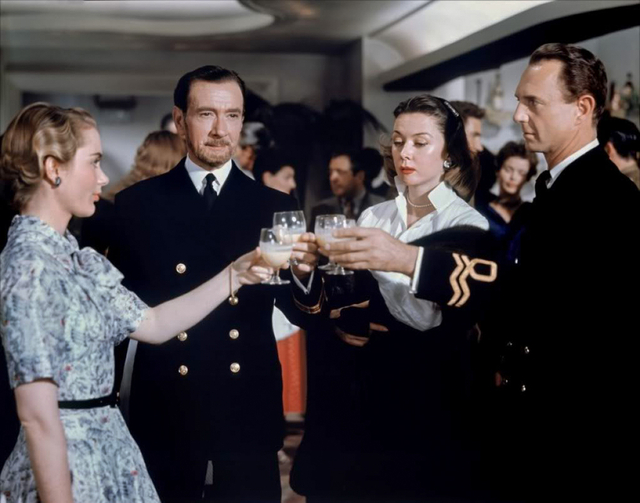
There is no Jean Leslie in The Man Who Never Was – official secrecy and Montagu's own discretion would see to that. Macdonald's character is subdivided for Neame's film into two women: the coolly efficient upper class blonde Pam (Josephine Griffin) and her American roommate Lucy, played by Gloria Grahame.
Since she's played by Grahame, Lucy is a sexy but emotionally fragile woman, a librarian by day who dates a series of servicemen by night, struggling not to become emotionally involved with men who might not survive to the end of the year, never mind the war. She's the hot point in an emotionally cool film, set during the war but filmed in the drab, colourless streets of postwar Austerity Britain.
The most interesting contrast between the two films is the treatment of Major Martin, an important but nonspeaking role – the "man who never was." When Montagu wrote his book and Neame made the film, Martin's identity was still a secret. Montagu wrote that he was looking for a body that had died of pneumonia, and elaborates no further on the once-living person once his corpse is acquired.
In Neame's film, the body is that of a young Scotsman, introduced to Webb's Montagu with his estranged father in attendance. There's a long, sombre scene where Montagu has to convince the mourning man that his son's body will be treated with all suitable dignity, and that his role after his death will play a great part in his country's ultimate victory over darkness.
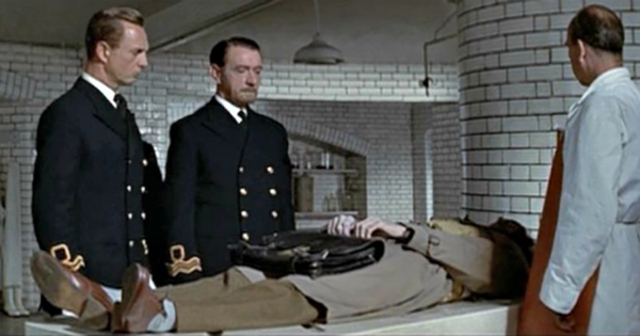
There's real reverence in the film's treatment of Major Martin; his face is never seen, his remains are handled with the respect you'd accord a sacred object. His presence – itself a loaded absence – strikes everyone who meets him with sadness and humility. There's no way of saying this with certainty, but it seems to come from a society that still has a role for God and religion, and where most adults have a more than passing acquaintance with death up close.
The real identity of Major William Martin was no longer a secret five decades after the end of the war; in 1998 the British government amended the headstone on Maj. Martin's grave in Huelva, Spain to include the name of Glyndwr Michael, the unfortunate Welshman whose body was at the centre of Operation Mincemeat. He was a homeless tramp, born in Aberbargoed, the son of a coal miner who killed himself when he was 15 and whose mother died when he was 31, just three years before Glyndwr was found in a derelict warehouse in London after ingesting bread laced with rat poison.
He lingered for two days in St. Pancras Hospital before dying; Madden's film shows his last hours, attended by a compassionate nurse. His body is collected by Sir Bentley Purchase, the London head coroner who had been tasked by Montagu with finding a suitable corpse. (Purchase is played by the late Paul Ritter, the actor made a huge impression as Dyatlov in the HBO miniseries Chernobyl. Operation Mincemeat would be his last film.)
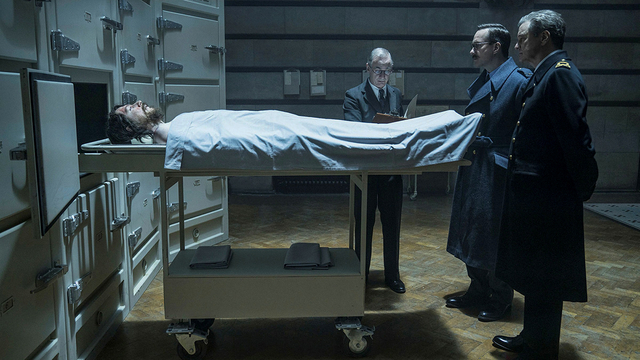
From this point on the reverence alternates with the comic; Montagu and Cholmondeley try to photograph the corpse for Major Martin's identity card, his head lolling about as they work, the results predictably zombie-like. Later, the body is autopsied in a shed on the sunny Spanish coast – its gas-filled torso is popped like a foul balloon, and the enthusiastic coroner extracts intestines with a flourish like a coil of botifarra.
One "too good to be true" detail that Operation Mincemeat maintains is that the HMS Seraph, the British submarine that set Martin/Michael's body onto the coastal tides by Huelva, would be a pathfinding ship for the invasion of Sicily; we see it in the first scene of the movie, dropping a homing buoy in a storm with the invasion fleet following it. The submarine was still in service in the Royal Navy a decade later, and played itself in The Man Who Never Was.
The delivery of Glyndwr Michael's body to the beaches at Huelva is only half the story, and it's no surprise that the tone of both films changes once it's accomplished. The drama from this point on revolves around the network of spies and fascist sympathizers in Spain helping the Germans intercept the paperwork Maj. Martin is carrying. That this was managed with remarkable alacrity is an unfortunate obstacle in the way of this drama, and both films rely on considerable invention to make up for this shortfall.
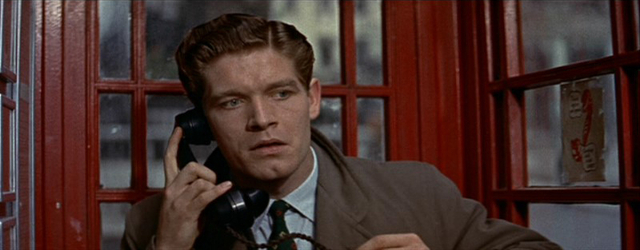
In The Man Who Never Was, Neame and screenwriter Nigel Balchin introduce Stephen Boyd as O'Reilly, an Irishman sent by the Abwehr to check on the details in Martin's cover story. From the moment O'Reilly arrives on the ferry at Liverpool, the existence of an Irish underground working against Britain and, by inference, sympathetic to their Nazi enemies, is presented as a given, at least for British audiences.
Boyd ends up at the apartment Pam and Lucy share, where he introduces himself as a friend of the late Maj. Martin. Pam stumbles, never expecting the ruse would be investigated, but Lucy is emotionally prepared to play the grieving fiancée, having just learned that her latest beau, an RAF pilot, was killed in action.
Grahame has two big scenes in The Man Who Never Was, both played with an emotional intensity that the rest of the film notably lacks. In the first, she dictates the last love letter that "Pam" writes to Martin for her roommate, which the dead man carries in his pocket. In the second she breaks down in front of Pam and O'Reilly, stricken by her loss, convincing the Irish spy that Martin was real. They're incredible scenes, but Grahame plays them like she's in a completely different movie from everyone else.
Kelly Macdonald's Jean has two similar scenes in Operation Mincemeat. In the first, she reads a draft of Pam's letter to her quartet of co-conspirators, written by Wilton's Hester. (It's at least a partially accurate moment; the real letter was penned by a spinster who worked in Montagu's office, as the versions written by young women tasked with the job didn't ring true.)
In the second scene, Jean returns to her flat to find the snapshot she gave Cholmondeley to place on Martin's body sitting on a table, put there by a man she knew as a waiter in Montagu's club. He's an agent in the employ of the Abwehr, sent by Colonel Alexis von Roenne, an Abwehr officer close to Hitler and part of a network of conspirators in the German high command planning to assassinate Hitler. He would be executed after the failure of Valkyrie, the 1944 bomb plot.
Roenne actually did forward Allied disinformation like Mincemeat to Hitler, knowing that his treason was shortening the war. In The Man Who Never Was his role is taken by Admiral Wilhelm Canaris, the chief of the Abwehr, though Neame's film doesn't bother with the fact that Canaris, like von Roenne, was also conspiring against Hitler, and would die naked on the gallows at Flossenbürg concentration camp in 1945.
The truth is that German espionage and intelligence was fatally compromised not just by the codebreakers at Bletchley Park and British guile but by the active sabotage of men like Canaris and von Roenne. Hitler also believed fervently that the Allies would invade through Greece and that Sicily was a diversion, much as he was convinced a year later that Normandy was a feint and that the real D-Day would happen at Calais; the false clues planted by Operation Mincemeat really just provided confirmation bias for the Fuhrer.
His total power at the pinnacle of the Nazi state made dissent from his opinions not just difficult but dangerous. In the end, the wonder isn't that the Allies were able to defeat the Nazis, but that they didn't defeat them sooner; the survival of Hitler's regime is a testament to the odds stacked against conspirators like Canaris and von Roenne, and to the effectiveness of the surveillance and terror overseen by the SS and the Gestapo right until the last days of the war. Still, the idea that either Canaris or von Roenne sent agents to London to inquire into the existence or non-existence of Major William Martin is pure invention.
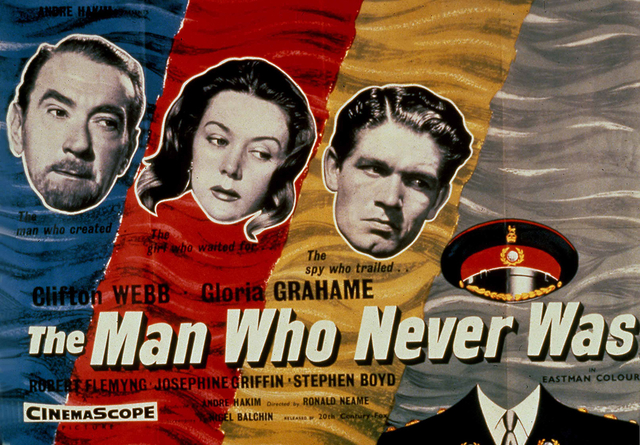
But Operation Mincemeat goes beyond the call of duty to paint a picture of desperate British efforts to make sure Martin's briefcase will fall into Nazi hands. After the Spanish prove to be unexpectedly efficient in Huelva, it looks like Martin's paperwork will be neatly returned to the British embassy, until Montagu and Cholmondeley send urgent orders to Captain David Ainsworth, the naval attaché in Madrid.
As played by Nicholas Rowe, Ainsworth is the closest thing the film has to James Bond; he's played as an ambisexual superspook, using his elaborate cover stories and dexterous digits to coax the cooperation of both a secretary in the Spanish naval office and a Nazi sympathizer in Spain's secret police. If Operation Mincemeat were a true story, the handjob administered by Ainsworth on a park bench in Madrid did as much to change the course of the war as the body of Glyndwr Michael.
You'd imagine that the sheer improbability at every turn of the real story of Major William Martin RM would be enough for any movie, but cinematic evidence testifies to the contrary. So it's worth remembering that, in every picture "based on a true story," the truth – which even at its most implausible is still insufficiently dramatic – is accompanied by a bodyguard, a posse, a platoon, an ensemble and a high-kicking chorus line of lies.
Mark Steyn Club members can let Rick know what they think by logging in and sharing in the comments below, as access to the comments section is one of many benefits that comes along with membership in the Mark Steyn Club.


